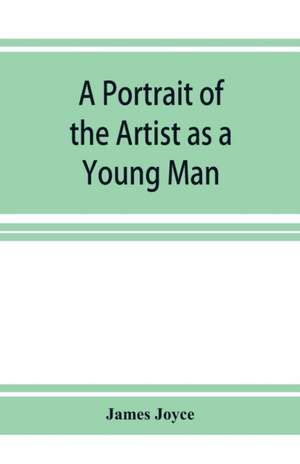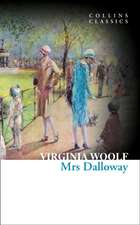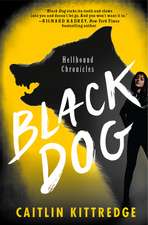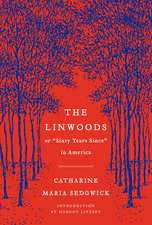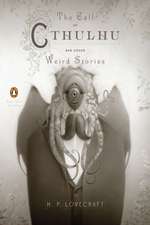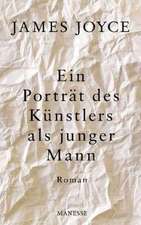A Portrait of the Artist as a Young Man
Autor James Joyceen Limba Engleză Paperback – dec 2019
| Toate formatele și edițiile | Preț | Express |
|---|---|---|
| Paperback (50) | 20.23 lei 3-5 săpt. | +7.17 lei 7-13 zile |
| HarperCollins Publishers – 15 apr 2025 | 20.23 lei 3-5 săpt. | +7.17 lei 7-13 zile |
| Bantam Classics – 31 dec 1991 | 33.60 lei 3-5 săpt. | |
| Signet Classics – 31 oct 2006 | 33.77 lei 3-5 săpt. | |
| Dover Publications – 30 apr 1994 | 34.87 lei 3-5 săpt. | |
| Oxford University Press – 12 iun 2008 | 39.14 lei 10-16 zile | +16.64 lei 7-13 zile |
| Quercus Books – 14 mar 2024 | 47.65 lei 3-5 săpt. | +22.91 lei 7-13 zile |
| CREATESPACE – | 48.86 lei 3-5 săpt. | |
| Penguin Books – 23 feb 2000 | 49.34 lei 23-34 zile | +19.68 lei 7-13 zile |
| UNION SQUARE & CO – 2 ian 2025 | 50.65 lei 3-5 săpt. | +18.40 lei 7-13 zile |
| Alma Books COMMIS – 18 noi 2014 | 52.13 lei 3-5 săpt. | +12.15 lei 7-13 zile |
| Vintage Publishing – 6 dec 2012 | 53.03 lei 23-34 zile | +18.85 lei 7-13 zile |
| CreateSpace Independent Publishing Platform – | 53.50 lei 3-5 săpt. | |
| CreateSpace Independent Publishing Platform – | 57.37 lei 3-5 săpt. | |
| CREATESPACE – | 62.30 lei 3-5 săpt. | |
| Mint Editions – mai 2021 | 63.87 lei 3-5 săpt. | |
| CREATESPACE – | 63.90 lei 3-5 săpt. | |
| Penguin Books – 28 feb 2003 | 64.54 lei 3-5 săpt. | |
| – | 66.59 lei 3-5 săpt. | |
| CREATESPACE – | 70.21 lei 3-5 săpt. | |
| – | 74.26 lei 3-5 săpt. | |
| CREATESPACE – | 74.69 lei 3-5 săpt. | |
| CREATESPACE – | 74.75 lei 3-5 săpt. | |
| CreateSpace Independent Publishing Platform – | 74.93 lei 3-5 săpt. | |
| Blurb – 9 noi 2022 | 76.86 lei 3-5 săpt. | +5.81 lei 7-13 zile |
| Penguin Books – 3 aug 2016 | 79.71 lei 23-34 zile | +28.52 lei 7-13 zile |
| – | 80.20 lei 3-5 săpt. | |
| CREATESPACE – | 82.11 lei 3-5 săpt. | |
| CREATESPACE – | 86.63 lei 3-5 săpt. | |
| CREATESPACE – | 102.19 lei 3-5 săpt. | |
| CREATESPACE – | 104.80 lei 3-5 săpt. | |
| – | 110.39 lei 3-5 săpt. | |
| CREATESPACE – | 111.53 lei 3-5 săpt. | |
| Penguin Books – 31 mai 1977 | 180.63 lei 3-5 săpt. | |
| AZILOTH BOOKS – 3 mar 2019 | 72.56 lei 6-8 săpt. | |
| Bloomsbury Publishing – 25 sep 2018 | 78.54 lei 6-8 săpt. | |
| Lulu.Com – 24 aug 2018 | 80.18 lei 6-8 săpt. | |
| Tark Classic Fiction – 30 apr 2009 | 81.78 lei 6-8 săpt. | |
| – | 84.77 lei 6-8 săpt. | |
| – | 86.79 lei 6-8 săpt. | |
| Lulu.Com – 19 mar 2018 | 88.85 lei 6-8 săpt. | |
| – | 106.18 lei 38-44 zile | |
| Martino Fine Books – 11 dec 2018 | 111.33 lei 38-44 zile | |
| Bibliotech Press – 9 ian 2023 | 111.53 lei 6-8 săpt. | |
| Alpha Editions – dec 2019 | 116.42 lei 6-8 săpt. | |
| Lulu – 7 feb 2016 | 129.00 lei 6-8 săpt. | |
| Urban Romantics – 5 oct 2011 | 140.12 lei 38-44 zile | |
| Antiquarius – 19 oct 2020 | 144.13 lei 38-44 zile | |
| Simon & Brown – 31 aug 2010 | 147.32 lei 38-44 zile | |
| CreateSpace Independent Publishing Platform – | 160.81 lei 6-8 săpt. | |
| TREDITION CLASSICS – 31 oct 2012 | 222.36 lei 6-8 săpt. | |
| Hardback (11) | 46.63 lei 3-5 săpt. | +29.99 lei 7-13 zile |
| Pan Macmillan – 23 ian 2017 | 46.63 lei 3-5 săpt. | +29.99 lei 7-13 zile |
| Flame Tree Publishing – 9 iun 2020 | 52.05 lei 3-5 săpt. | +12.40 lei 7-13 zile |
| EVERYMAN – 26 sep 1991 | 88.28 lei 23-34 zile | +35.88 lei 7-13 zile |
| Mint Editions – 13 mai 2021 | 115.66 lei 3-5 săpt. | |
| chiltern publishing – 26 oct 2021 | 127.51 lei 3-5 săpt. | +19.59 lei 7-13 zile |
| Everyman's Library – 30 sep 1991 | 155.09 lei 3-5 săpt. | |
| Bibliotech Press – 9 ian 2023 | 192.21 lei 6-8 săpt. | |
| – | 195.11 lei 6-8 săpt. | |
| Lulu.Com – 19 mar 2018 | 198.59 lei 6-8 săpt. | |
| Simon & Brown – noi 2018 | 201.86 lei 38-44 zile | |
| TREDITION CLASSICS – 30 noi 2012 | 296.11 lei 6-8 săpt. |
Preț: 116.42 lei
Nou
22.28€ • 23.31$ • 18.51£
Carte tipărită la comandă
Livrare economică 02-16 aprilie
Specificații
ISBN-10: 9353926440
Pagini: 304
Dimensiuni: 140 x 216 x 18 mm
Greutate: 0.43 kg
Editura: Alpha Editions
Notă biografică
From the Paperback edition.
Extras
"Et ignotas animum dimittit in artes."
ovid, metamorphoses, viii., 18.
ONCE UPON a time and a very good time it was there was a moocow coming down along the road and this moocow that was down along the road met a nicens little boy named baby tuckoo. . . .
His father told him that story: his father looked at him through a glass: he had a hairy face.
He was baby tuckoo. The moocow came down the road where Betty Byrne lived: she sold lemon platt.
O, the wild rose blossoms
On the little green place.
He sang that song. That was his song.
O, the green wothe botheth.
When you wet the bed, first it is warm then it gets cold. His mother put on the oilsheet. That had the queer smell.
His mother had a nicer smell than his father. She played on the piano the sailor's hornpipe for him to dance. He danced:
Tralala lala,
Tralala tralaladdy,
Tralala lala,
Tralala lala.
Uncle Charles and Dante clapped. They were older than his father and mother but Uncle Charles was older than Dante.
Dante had two brushes in her press. The brush with the maroon velvet back was for Michael Davitt and the brush with the green velvet back was for Parnell. Dante gave him a cachou every time he brought her a piece of tissue paper.
The Vances lived in number seven. They had a different father and mother. They were Eileen's father and mother. When they were grown up he was going to marry Eileen. He hid under the table.
His mother said:
—O, Stephen will apologise.
Dante said:
—O, if not, the eagles will come and pull out his eyes—
Pull out his eyes,
Apologise,
Apologise,
Pull out his eyes.
Apologise,
Pull out his eyes,
Pull out his eyes,
Apologise.
The wide playgrounds were swarming with boys. All were shouting and the prefects urged them on with strong cries. The evening air was pale and chilly and after every charge and thud of the foot-ballers the greasy leather orb flew like a heavy bird through the grey light. He kept on the fringe of his line, out of sight of his prefect, out of the reach of the rude feet, feigning to run now and then. He felt his body small and weak amid the throng of players and his eyes were weak and watery. Rody Kickham was not like that: he would be captain of the third line all the fellows said.
Rody Kickham was a decent fellow but Nasty Roche was a stink. Rody Kickham had greaves in his number and a hamper in the refectory. Nasty Roche had big hands. He called the Friday pudding dog-in-the-blanket. And one day he had asked:
—What is your name?
Stephen had answered: Stephen Dedalus.
Then Nasty Roche had said:
—What kind of a name is that?
And when Stephen had not been able to answer Nasty Roche had asked:
—What is your father?
Stephen had answered:
—A gentleman.
Then Nasty Roche had asked:
—Is he a magistrate?
He crept about from point to point on the fringe of his line, making little runs now and then. But his hands were bluish with cold. He kept his hands in the side pockets of his belted grey suit. That was a belt round his pocket. And belt was also to give a fellow a belt. One day a fellow had said to Cantwell:
—I'd give you such a belt in a second.
Cantwell had answered:
—Go and fight your match. Give Cecil Thunder a belt. I'd like to see you. He'd give you a toe in the rump for yourself.
That was not a nice expression. His mother had told him not to speak with the rough boys in the college. Nice mother! The first day in the hall of the castle when she had said goodbye she had put up her veil double to her nose to kiss him: and her nose and eyes were red. But he had pretended not to see that she was going to cry. She was a nice mother but she was not so nice when she cried. And his father had given him two five-shilling pieces for pocket money. And his father had told him if he wanted anything to write home to him and, whatever he did, never to peach on a fellow. Then at the door of the castle the rector had shaken hands with his father and mother, his soutane fluttering in the breeze, and the car had driven off with his father and mother on it. They had cried to him from the car, waving their hands:
—Good-bye, Stephen, goodbye!
—Good-bye, Stephen, goodbye!
He was caught in the whirl of a scrimmage and, fearful of the flashing eyes and muddy boots, bent down to look through the legs. The fellows were struggling and groaning and their legs were rubbing and kicking and stamping. Then Jack Lawton's yellow boots dodged out the ball and all the other boots and legs ran after. He ran after them a little way and then stopped. It was useless to run on. Soon they would be going home for the holidays. After supper in the study hall he would change the number pasted up inside his desk from seventyseven to seventysix.
It would be better to be in the study hall than out there in the cold. The sky was pale and cold but there were lights in the castle. He wondered from which window Hamilton Rowan had thrown his hat on the haha and had there been flowerbeds at that time under the windows. One day when he had been called to the castle the butler had shown him the marks of the soldiers' slugs in the wood of the door and had given him a piece of shortbread that the community ate. It was nice and warm to see the lights in the castle. It was like something in a book. Perhaps Leicester Abbey was like that. And there were nice sentences in Doctor Cornwell's Spelling Book. They were like poetry but they were only sentences to learn the spelling from.
Wolsey died in Leicester Abbey
Where the abbots buried him.
Canker is a disease of plants,
Cancer one of animals.
It would be nice to lie on the hearthrug before the fire, leaning his head upon his hands, and think on those sentences. He shivered as if he had cold slimy water next his skin. That was mean of Wells to shoulder him into the square ditch because he would not swop his little snuffbox for Wells's seasoned hacking chestnut, the conqueror of forty. How cold and slimy the water had been! A fellow had once seen a big rat jump into the scum. Mother was sitting at the fire with Dante waiting for Brigid to bring in the tea. She had her feet on the fender and her jewelly slippers were so hot and they had such a lovely warm smell! Dante knew a lot of things. She had taught him where the Mozambique Channel was and what was the longest river in America and what was the name of the highest mountain in the moon. Father Arnall knew more than Dante because he was a priest but both his father and Uncle Charles said that Dante was a clever woman and a wellread woman. And when Dante made that noise after dinner and then put up her hand to her mouth: that was heartburn.
A voice cried far out on the playground:
—All in!
Then other voices cried from the lower and third lines:
—All in! All in!
The players closed around, flushed and muddy, and he went among them, glad to go in. Rody Kickham held the ball by its greasy lace. A fellow asked him to give it one last: but he walked on without even answering the fellow. Simon Moonan told him not to because the prefect was looking. The fellow turned to Simon Moonan and said:
—We all know why you speak. You are McGlade's suck.
Suck was a queer word. The fellow called Simon Moonan that name because Simon Moonan used to tie the prefect's false sleeves behind his back and the prefect used to let on to be angry. But the sound was ugly. Once he had washed his hands in the lavatory of the Wicklow Hotel and his father pulled the stopper up by the chain after and the dirty water went down through the hole in the basin. And when it had all gone down slowly the hole in the basin had made a sound like that: suck. Only louder.
To remember that and the white look of the lavatory made him feel cold and then hot. There were two cocks that you turned and water came out: cold and hot. He felt cold and then a little hot: and he could see the names printed on the cocks. That was a very queer thing.
And the air in the corridor chilled him too. It was queer and wettish. But soon the gas would be lit and in burning it made a light noise like a little song. Always the same: and when the fellows stopped talking in the playroom you could hear it.
It was the hour for sums. Father Arnall wrote a hard sum on the board and then said:
—Now then, who will win? Go ahead, York! Go ahead, Lancaster!
Stephen tried his best but the sum was too hard and he felt confused. The little silk badge with the white rose on it that was pinned on the breast of his jacket began to flutter. He was no good at sums but he tried his best so that York might not lose. Father Arnall's face looked very black but he was not in a wax: he was laughing. Then Jack Lawton cracked his fingers and Father Arnall looked at his copybook and said:
—Right. Bravo Lancaster! The red rose wins. Come on now, York! Forge ahead!
Jack Lawton looked over from his side. The little silk badge with the red rose on it looked very rich because he had a blue sailor top on. Stephen felt his own face red too, thinking of all the bets about who would get first place in Elements, Jack Lawton or he. Some weeks Jack Lawton got the card for first and some weeks he got the card for first. His white silk badge fluttered and fluttered as he worked at the next sum and heard Father Arnall's voice. Then all his eagerness passed away and he felt his face quite cool. He thought his face must be white because it felt so cool. He could not get out the answer for the sum but it did not matter. White roses and red roses: those were beautiful colours to think of. And the cards for first place and third place were beautiful colours too: pink and cream and lavender. Lavender and cream and pink roses were beautiful to think of. Perhaps a wild rose might be like those colours and he remembered the song about the wild rose blossoms on the little green place. But you could not have a green rose. But perhaps somewhere in the world you could.
The bell rang and then the classes began to file out of the rooms and along the corridors towards the refectory. He sat looking at the two prints of butter on his plate but could not eat the damp bread. The tablecloth was damp and limp. But he drank off the hot weak tea which the clumsy scullion, girt with a white apron, poured into his cup. He wondered whether the scullion's apron was damp too or whether all white things were cold and damp. Nasty Roche and Saurin drank cocoa that their people sent them in tins. They said they could not drink the tea; that it was hogwash. Their fathers were magistrates, the fellows said.
All the boys seemed to him very strange. They had all fathers and mothers and different clothes and voices. He longed to be at home and lay his head on his mother's lap. But he could not: and so he longed for the play and study and prayers to be over and to be in bed.
He drank another cup of hot tea and Fleming said:
—What's up? Have you a pain or what's up with you?
—I don't know, Stephen said.
—Sick in your bread basket—Fleming said—because your face looks white. It will go away.
—O yes, Stephen said.
But he was not sick there. He thought that he was sick in his heart if you could be sick in that place. Fleming was very decent to ask him. He wanted to cry. He leaned his elbows on the table and shut and opened the flaps of his ears. Then he heard the noise of the refectory every time he opened the flaps of his ears. It made a roar like a train at night. And when he closed the flaps the roar was shut off like a train going into a tunnel. That night at Dalkey the train had roared like that and then, when it went into the tunnel, the roar stopped. He closed his eyes and the train went on, roaring and then stopping; roaring again, stopping. It was nice to hear it roar and stop and then roar out of the tunnel again and then stop.
Then the higher line fellows began to come down along the matting in the middle of the refectory, Paddy Rath and Jimmy Magee and the Spaniard who was allowed to smoke cigars and the little Portuguese who wore the woolly cap. And then the lower line tables and the tables of the third line. And every single fellow had a different way of walking.
He sat in a corner of the playroom pretending to watch a game of dominos and once or twice he was able to hear for an instant the little song of the gas. The prefect was at the door with some boys and Simon Moonan was knotting his false sleeves. He was telling them something about Tullabeg.
Then he went away from the door and Wells came over to Stephen and said:
—Tell us, Dedalus, do you kiss your mother before you go to bed?
Stephen answered:
—I do.
Wells turned to the other fellows and said:
—O, I say, here's a fellow says he kisses his mother every night before he goes to bed.
The other fellows stopped their game and turned round, laughing. Stephen blushed under their eyes and said:
—I do not.
Wells said:
—O, I say, here's a fellow says he doesn't kiss his mother before he goes to bed.
They all laughed again. Stephen tried to laugh with them. He felt his whole body hot and confused in a moment. What was the right answer to the question? He had given two and still Wells laughed. But Wells must know the right answer for he was in third of grammar. He tried to think of Wells's mother but he did not dare to raise his eyes to Wells's face. He did not like Wells's face. It was Wells who had shouldered him into the square ditch the day before because he would not swop his little snuffbox for Wells's seasoned hacking chestnut, the conqueror of forty. It was a mean thing to do; all the fellows said it was. And how cold and slimy the water had been! And a fellow had once seen a big rat jump plop into the scum.
From the Paperback edition.
Recenzii
“One believes in Stephen Dedalus as one believes in few characters in fiction.” –H. G. Wells
“[Mr. Joyce is] concerned at all costs to reveal the flickerings of that innermost flame which flashes its myriad message through the brain, he disregards with complete courage whatever seems to him adventitious, though it be probability or coherence or any other of the handrails to which we cling for support when we set our imaginations free.” –Virginia Woolf
“[A Portrait of the Artist as a Young Man will] remain a permanent part of English literature.” –Ezra Pound
With an Introduction by Richard Brown
Descriere
'Once upon a time and a very good time it was there was a moocow coming down along the road and this moocow that was coming down along the road met a nicens little boy named baby tuckoo 'So begins one of the most significant literary works of the twentieth century, and one of the most innovative. Its originality shocked contemporary readers on its publication in 1916 who found its treating of the minutiae of daily life indecorous, and its central character unappealing. Was it art or was it filth?The novel charts the intellectual, moral, and sexual development of Stephen Dedalus, from his childhood listening to his father's stories through his schooldays and adolescence to the brink of adulthood and independence, and his awakening as an artist. Growing up in a Catholic family in Dublin in the final years of the nineteenth century, Stephen's consciousness is forged by Irish history and politics, by Catholicism and culture, language and art. Stephen's story mirrors that of Joyce himself, and the novel is both startlingly realistic and brilliantly crafted.For this edition Jeri Johnson, editor of the acclaimed Ulysses 1922 text, has written an introduction and notes which together provide a comprehensive and illuminating appreciation of Joyce's artistry.ABOUT THE SERIES: For over 100 years Oxford World's Classics has made available the widest range of literature from around the globe. Each affordable volume reflects Oxford's commitment to scholarship, providing the most accurate text plus a wealth of other valuable features, including expert introductions by leading authorities, helpful notes to clarify the text, up-to-date bibliographies for further study, and much more.
Textul de pe ultima copertă
Like much of James Joyce's work, "A Portrait of the Artist as a Young Man" is a fictional re-creation of the Irish writer's own life and early environment. The experiences of the novel's young hero, Stephen Dedalus, unfold in astonishingly vivid scenes that seem freshly recalled from life and provide a powerful portrait of the coming of age of a young man of unusual intelligence, sensitivity, and character.
The interest of the novel is deepened by Joyce's telling portrayals of an Irish upbringing and schooling, the Catholic Church and its priesthood, Parnell and Irish politics, encounters with the conflicting roles of art and morality (problems that would follow Joyce throughout his life), sexual experimentation and its aftermath, and the decision to leave Ireland.
Rich in details that offer vital insights into Joyce's art, this masterpiece of semiautobiographical fiction remains essential reading in any program of study in modern literature.
Caracteristici
Cuprins
I. A Portrait of the Artist as a Young Man: The Text
A Note on the Text
Related Texts by Joyce
Editorial Note
A Portrait of the Artist
Epiphanies
From Stephen Hero: Emma Cleary; I Will Not Submit; The Convent Girls; You Are Mad, Stephen; Epiphanies
The Trieste Notebook
From Ulysses: Let Me Be and Let Me Live; The Only True Thing in Life?; Nothung!
From Finnegans Wake: Shem the Penman; The Haunted Inkbottle
III. A Portrait of the Artist as a Young Man: Criticism
Early Comment:
Ezra Pound, Letter to Joyce
Edward Garnett, Reader's Report
Ezra Pound, James Joyce: At Last the Novel Appears
Diego Angeli, Extracts from Il Marzocco
H. G. Wells, James Joyce
The Egoist, Extracts from Press Notices
The Egoist, James Joyce and His Critics: Some Classified Comments
The Tradition and the New Novel:
Maurice Beebe, The Artist as Hero
Irene Hendry Chayes, Joyce's Epiphanies
Frank O'Connor, Joyce and Dissociated Metaphor
William York Tindall, The Literary Symbol
General Readings:
Richard Ellmann, The Growth of Imagination
Harry Levin, The Artist
Hugh Kenner, The Portrait in Perspective
Kenneth Burke, Definitions
Controversy: The Question of Esthetic Distance:
Editor's Introduction
Wayne Booth, The Problem of Distance in A Portrait of the Artist
Robert Scholes, Stephen Dedlaus, Poet or Esthete?
IV. Explanatory Notes
Chronology
Topics for Discussion and Papers
Selected Bibliography
